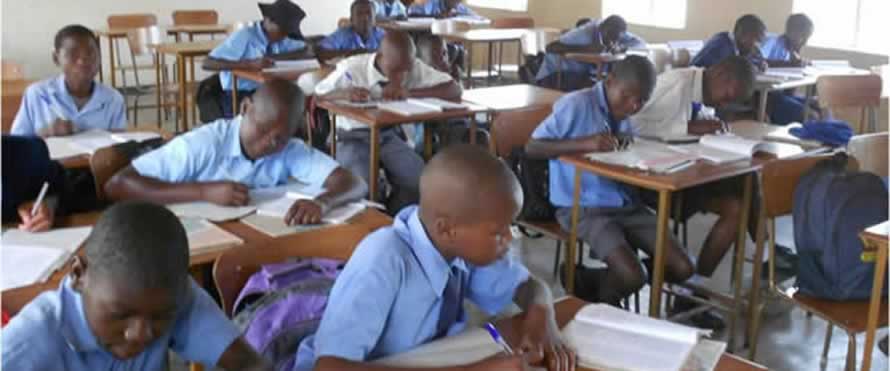
The Sunday News

Ministry proposes changes to school curriculum
THE Ministry of Primary and Secondary Education has come up with a draft curriculum framework which proposes a raft of changes to the schools curriculum, which will see among other things the introduction of industrial attachment for O-level pupils after completing their examinations.
Also proposed in the draft framework is the inclusion of continuous assessment of learners by teachers and coursework grading of learners, as opposed to the present grading system which is examination-based.
This follows consultations with various stakeholders in the education sector in all the country’s 10 provinces as part of the ministry’s curriculum review programme which started in October last year.
The draft curriculum framework aims to guide learning and teaching for the period 2015 to 2022 in line with recommendations of the Presidential Commission of Inquiry on Education and Training (CIET) of 1999, commonly known as the Nziramasanga Report.
Permanent Secretary in the Ministry of Primary and Secondary Education Dr Sylvia Utete-Masango told Sunday News last week that the proposed curriculum review was an update of the Nziramasanga Report, noting that some of the recommendations in the report had been overtaken by events, hence the need for fresh consultations and update.
She said the main thrust of the curriculum review programme was to come up with a philosophy underpinned education system that emphasises on value systems such as Ubuntu/Hunhu, and national heritage, with the aim to produce “a whole person”.
She said a Life Long Orientation Programme proposed in the framework, would see O-level pupils being attached to various institutions soon after completing writing their examinations as a way to help them develop life skills and be productive members of society.
“After writing examinations students will be required to be attached to institutions in their communities where they will be providing services. We are looking at charitable organisations like Jairos Jiri and so on. The student will be required to undertake a project at the institution where they will be attached. Upon completing the project their supervisor will write a report on the student’s performance. This will help students in developing life skills, leadership skills and be team players.
“Such programmes will also help to identify students’ ability outside the classroom or learning environment. Some former Group A and private schools are doing this of course at a smaller scale and we would want to launch it at a much bigger scale. European countries have such programmes in their schools and they are quite useful in developing learners,” he said.
The curriculum review framework also emphasises on continuous assessment of learners at all levels where 50 percent of learners’ grades in junior school will be determined by continuous assessment and the other 50 percent based on the Grade Seven national examinations. O-level learners’ grades will be based on 40 percent theoretical examinations, 30 percent practical examinations and 30 percent continuous assessment.
Dr Utete-Masango said the proposed changes to the grading system would help in identifying learners’ abilities for those abilities to be nurtured at an early stage and developed for learners to realise their full potential.
“Assessment of learners will change from what we have where we have summative examinations determining the student’s grades. Continuous assessment allows for teachers at the Early Childhood Development stage to detect the learner’s abilities at the formative stage and profile them. When the learner moves to junior school they go with their profile and the next teacher will further develop the abilities and it goes on and on right through the system.
“For example if a learner has a bias towards art, teachers will have to make sure that the learner is nurtured in that area. The ability of the learner should be captured in a more objective manner so that the final result is a true reflection of the learner,” she said.
Dr Utete-Masango said the ministry would engage specialists to determine what constitutes continuous assessment in order to standardise the system. She said teachers would also have to undergo training on the new grading system for them to be able to accurately capture learner’s abilities and nurture them.
The curriculum review framework also emphasises on strengthening of Mathematics, Science, Technology, vocational studies and Humanities and Heritage studies, areas that would be made compulsory at all levels in the learning process. Mathematics and Science will thus become prerequisite for primary and secondary school teacher training programmes.
Dr Utete-Masango said her ministry had carried out a validation process of the curriculum framework a fortnight ago during which stakeholders checked the document against their contribution, after which the document would be presented to Cabinet for approval.
“What is left now is for us to come up with prototype syllabi that will accompany the draft curriculum framework when we submit it to Cabinet. This will guide Cabinet on what exactly we are proposing. Once that is done and Cabinet approves then we will move to develop the actual syllabi. We are almost ready and hopefully the draft will be approved by Cabinet before June this year,” she said.
The Ministry of Primary and Secondary Education embarked on the curriculum review programme in October last year, holding consultative meetings in all parts of the country, with over 900 000 people having been consulted during the process.
All the 8 179 primary and secondary schools in the country were turned into consultation centres where stakeholders were invited to give their input on the curriculum review exercise, input which was then synthesised into a curriculum review framework.



